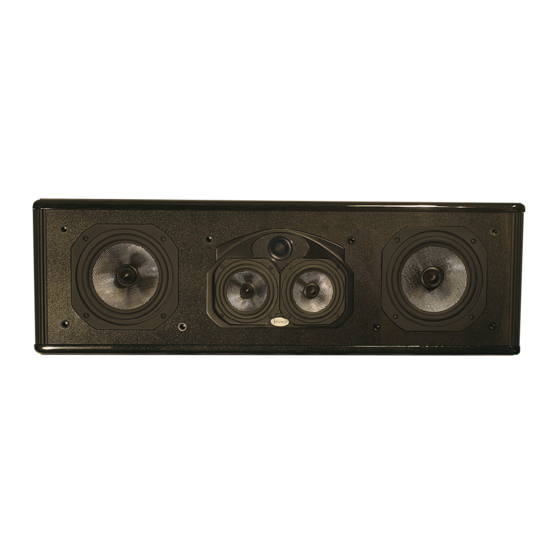Summary of Contents for Legacy Harmony Center
- Page 1 Owners Manual For The Harmony Center Loudspeaker System...
-
Page 2: Table Of Contents
Table of Contents Page Registration Owners Record The Cabinetry / Our Commitment Setup Unpacking Your Speakers Speaker Installation 6-11 Hooking Up Cables 12-14 Amplification 15-19 Technology Designer’s Note Specifications... -
Page 3: Owners Record
Refer to this when calling your dealer regarding this product. Model: Harmony Center HD Serial No: _________________________ Date of purchase: ___________________ Thank you for selecting a Legacy Loudspeaker System. These hand- crafted instruments will provide you with many years of listening en- joyment. -
Page 4: The Cabinetry / Our Commitment
Our Commitment A great deal of forethought, love and satisfaction is instilled in each piece of Legacy workmanship. We take pride in getting to know many of our customers on a first name basis. Your purchase of this product is backed by the renowned “Legacy... -
Page 5: Unpacking Your Speakers
V-board corner protectors. Molded foam end caps are used to protect the elegant cabinetry, and a plastic liner is provided as waterproofing. Please save this packing for future transportation. If cartons become damaged or misplaced, new ones can be purchased from Legacy Audio. -
Page 6: Speaker Installation
Speaker Installation Precautions If you have any doubts about your ability to properly install in-wall loud- speakers, you should consider the services of a custom installer. If you plan to install them yourself, always use high quality tools to save time and make the installation go more smoothly. - Page 7 Speaker Installation Installing the Harmony In-Wall Loudspeakers Packing List Harmony Center Speaker Installation Manual (2) Support Blocks (4) Support Block Screws (2) Tensioning Screws Tools Required Pencil Drywall Saw Level Phillips Screwdriver Tape Measure Mallet...
- Page 8 When wiring, it is useful to leave several extra feet of speaker cable at the speaker end. Select the wall locations for the Har- mony system. Legacy has designed the Harmony Center to be located either above or below a thin profile wall monitor.
- Page 9 Speaker Installation Locate and cut opening through drywall centering it on two studs with the standard 16” spacing. Refer to drawing for dimensions. In new construction you want to frame the opening and place the studs at a more convenient location.
- Page 10 Speaker Installation Securely attach the two rubber lined wooden locks to the inside face of the studs, using the two 2 ½” long screws supplied. Use a bubble level to insure that they are level with each other and square with the wall.
- Page 11 Speaker Installation 4. Remove the cabinet from wall to expose the hanger blocks. 5. Drill a 1/8” pilot hole, 1 ½” to 2” at each marked location. 6. Connect the wires to the terminal plate located at the bottom of the cabinet and re- place the cabinet in the hanger blocks as before.
-
Page 12: Hooking Up Cables
Hooking Up Cables Before you purchase loudspeaker wire, check local building codes to make sure that the wire is rated to comply with applicable local safety codes such as UL or CL-2. Use only stranded wire no thinner than AWG 16. For runs longer than 100 feet, we recommend mini- mum of AWG 14. - Page 13 Hooking Up Cables The ideal conductor would have negligible resistance, inductance and capacitance. The table below shows how a few actual speaker cables measure up. Cable s/ft pF/ft µH/ft 12 ga. 0.0033 0.21 14 ga. 0.0048 0.13 16 ga. 0.0079 0.18 18 ga.
- Page 14 Hooking Up Cables What about phase shift due to frequency dependent travel times down the speaker cable? Measurements show that 100 Hz waves will be delayed about 20 billionths of a second behind 10 kHz waves when traveling to the end of a 10 foot speaker cable. Since the cilia of the ear requires 25,000 times longer than this just to transmit phase information, phase shifting is obviously not the primary concern when considering speaker cables.
-
Page 15: Amplification
For this reason, extensive measures have been taken to ensure that each Legacy speaker system represents a smooth, non-reactive load to virtually any amplifier. Often there is much confusion regarding amplification and loudness levels. It should be under- stood that the role of the amplifier goes beyond that of driving loudspeakers to a given sound pressure level. - Page 16 Some audiophiles feel that 200 watts per channel is the bare minimum to avoid audible clipping distortion when reproducing music at “live” playback levels. Your Legacy speakers are designed to take advan- tage of “high-powered” amplifiers, so don’t be afraid to put them through their paces.
- Page 17 Amplification When an amplifier is unable to fulfill your loudspeakers demands, a damaging harmonic spike may be leaked to the high frequency drivers. Another important point regarding loudness is that the dB scale is a logarithmic one. This means that a 150 Watt amplifier will potentially sound only twice as loud as a 15 Watt amplifier.
-
Page 18: Designer's Note
The Harmony center was developed using the finest loudspeaker and crossover components available. Countless hours of computer modeling were spent to insure accurate audio reproduction in a variety of installations where placement compromises must sometimes be made. -
Page 19: Specifications
Specifications System Type: 5 drivers, 3 way Tweeter: 1” Silk Dual Diaphragm W/ Quadra-Pole Neodymium Motor Midwoofer: 2 x 5.25” Silver Graphite Woofer: 2 x 8” Silver Graphite Low Frequency Alignment: 3rd Order Assisted Frequency Response: 49Hz – 25 kHz Impedance: 4 Ohms Sensitivity:... - Page 20 Notes:...
- Page 21 ©2008 Legacy Audio 3023 E Sangamon Ave. Springfield, IL 62702 Phone: 800-283-4644 Fax: 217-544-1483...


















Need help?
Do you have a question about the Harmony Center and is the answer not in the manual?
Questions and answers